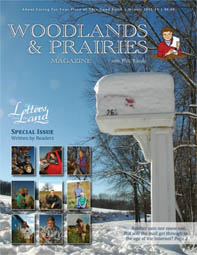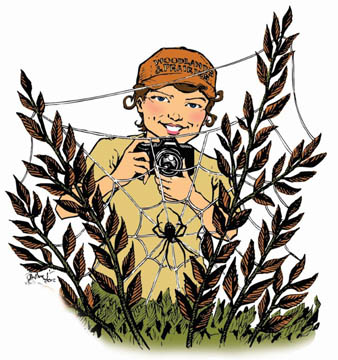 |
|||||||||||||||||||||||
 |
 |
||||||||||||||||||||||
|
Strength in Numbers: Mrs. Woods' guide to Natural Resource Organizations and Interests. |
|||||||||||||||||||||||
|
• Driftless Area Land Conservancy - http://www.driftlessconservancy.org – A nonprofit conservation organization dedicated to protecting the rural landscape and quality of life of Southwest Wisconsin. It facilitates voluntary private land conservation primarily through the use of conservation easements---to protect the farms, forests, prairies, wetlands, soils and natural beauty that define the Driftless Area. •http://forestrydegree.net/top-100-resources./ - A select list of 100 forestry websites covering the gamut of forest subjects, including conservation, wildlife, silviculture, economics, energy, nonprofit forestry groups, and public forests. It was compiled by ForestryDegree.net, a guide to online forestry degree programs http://forestrydegree.net. • The Iowa Environmental Council - http://www.iaenvironment.org - The Iowa Environmental Council an alliance of diverse organizations and individuals working together to protect Iowa's natural environment. • The Iowa Prairie Network - http://www.iowaprairienetwork.org - an all volunteer, non-profit (501c3) organization started in 1990. We are a network of people dedicated to the preservation of our prairie heritage in the state of Iowa. • Iowa Natural Heritage Foundation - http://www.inhf.org - a member-supported, nonprofit group, helping protect more than 100,000 acres of Iowa's prairies, wetlands, woodlands, greenways, trails and river corridors. Preserving Iowa's environment, water quality, wildlife, biodiversity, outdoor recreation and quality of life. • A database on the IPAW (Invasive Plants Association of Wisconsin) website - http://ipaw.org/webs/klinksearch.asp - an incredible database of over 500 websites relating to invasive plants and other environmental topics. • Kansas Native Plant Society - http://www.kansasnativeplantsociety.org/ - The Kansas Native Plant Society (KNPS) educates the public about the indigenous plants of Kansas - wildflowers, grasses, trees and others - found in our prairies, woodlands, wetlands, and gardens. • Kansas of Olde - http://kansasofolde.com/default.aspx - Kansas of Olde serves as a gathering place for those with ties to the Sunflower State who own properties listed on the state or national historic registers. In addition to historic homes, the site also promotes preservation of historic gardens featuring native plants. Kansas of Olde cooperated with the Kansas Native Plant Society in lobbying for legislation that named little bluestem as the Kansas state grass. It also champions native vegetation for roadsides.. • The Land Institute - http://www.landinstitute.org - Its purpose is to develop an agricultural system with the ecological stability of the prairie and a grain yield comparable to that from annual crops. Our strategy now is to collaborate with public institutions in order to direct more research in the direction of Natural Systems Agriculture. • Land Trust Alliance - http://www.landtrustalliance.org - Land trusts safeguard private lands from inappropriate development. This Website is all about making the legal arranagements to ensure that your land will conserve natural resources and provide vital ecological services for generations to come. The site links to a database of hundreds of land trusts and conservancy organizations. Click on http://www.ltanet.org/landtrustdirectory to find a land trust near you • Conserve Lake County - http://www.conservelakecounty.org - a countywide land trust located in Lake County, Ill., that acquires land or conservation easements on land through voluntary transactions with people who wish to preserve their properties' conservation values. • Missouri Prairie Foundation - http://www.moprairie.org - works with public and private partners to protect and restore our prairie and native grassland communities through land acquisition, management, education and research. • Monarch Watch - http://www.monarchwatch.org - an educational outreach program based at the University of Kansas that engages citizen scientists in large-scale research projects. This program produces real data that relate to a serious conservation issue. • North American Monarch Conservation Plan - http://www.cec.org/monarch (Commission for Environmental Cooperation) Canada, Mexico and the United States cooperating to protect North America's shared environment. • Native Plant Societies of the United States and Canada - http://www.michbotclub.org/links/native_plant_society.htm - Looking to share notes with like-minded people? This Web page provides links to 94 U.S. and 12 Canadian native plant societies and related non-profit membership organizations. Kudos to the Michigan Botantical Club, http://www.michbotclub.org, for providing this helpful directory • The Nature Conservancy - http://www.nature.org - The misson of the Nature Conservancy is to preserve the plants, animals and natural communities that represent the diversity of life on Earth by protecting the lands and waters they need to survive. (the Conservancy has chapters in every state) • The Ohio Prairie Association - http://www.ohioprairie.org - is a non-profit volunteer organization that promotes knowledge, appreciation, conservation, restoration, management, and expansion of Ohio prairie communities and their native plant and animal species to individuals, conservation organizations, public agencies educational institutions and others with an interest in native ecosystems. • PlantNative - http://www.plantnative.org/index.htm - is dedicated to moving native plants and naturescaping into mainstream landscaping practices. We believe this promotes biodiversity, preserves our natural heritage, reduces pollution and enhances livability. Our goal is to work with nursery owners, landscape professionals and consumers to increase public awareness of native plants and related landscaping practices and to increase both the supply of and demand for native plants. • Sponsored by the North American Pollinator Protection Campaign and the Pollinator Partnership - http://www.pollinator.org - The Pollinator Partnership (P2) is the D.B.A. for the 501(c)(3) non-profit Coevolution Institute. P2 works to protect the health of managed and native pollinating animals vital to our North American ecosystems and agriculture. The website is a premiere source of information for consumers, gardeners, land managers, educators, resource managers, producers, and farmers to help pollinators, essential components for all of life. • Prairies Forever (Missouri) - http://www.prairies.org - a 501(c)(3) nonprofit organization dedicated to promoting the ecological and cultural significance of the American prairie through education, outreach, and public engagement. •The Prairie Enthusiasts - http://www.theprairieenthusiasts.org - The Prairie Enthusiasts (TPE) is a private organization committed to the protection and management of native prairie and savanna of the Upper Midwest. We have an incorporated, nonprofit status and are a grass roots organization run mainly by volunteers. (Chapters in Wisconsin, Minnesota and Illinois) •The Nature Conservancy and Peter Kiewit Foundation - http://www.prairienebraska.org - partnering to restore native prairie to Nebraska through prairienebraska, a grassroots program. •The Grand Prairie Friends of Illinois - http://www.prairienet.org/gpf/intro.html - Grand Prairie Friends of Illinois is a nonprofit organization composed of people from many walks of life who share a commitment to preserving and restoring tallgrass prairie in East-Central Illinois. We acquire and manage prairie remnants, conduct prescribed burns, propagate and plant indigenous prairie species in reconstructions, and generate interest in prairies through a variety of educational programs. • http://www.prairieplains.org/index.htm - (Nebraska) A non-profit membership organization, Prairie Plains preserves, maintains and restores native prairies and wetlands on its own land and on other private and public lands. These conservation sites are used for community education, recreation and sustainable economic development. •The Tallgrass Prairie Center - http://www.tallgrassprairiecenter.org - mission is to develop research, techniques, education and Source identified seed for restoration and preservation of prairie vegetation in right-of-ways and other lands. • The Weed Science Society of America recently launched a new publication "Invasive Plant Science and Management". The quarterly journal is peer-reviewed and focuses on research concerning invasive plant species and biology.The quarterly can be accessed at: http://wssa.allenpress.com/perlserv/?request=get-toc&issn=1939-747X&ct=1 •The Wild Farm Alliance (WFA) - http://www.wildfarmalliance.org - established by a group of wildlands proponents and ecological farming advocates who share a concern for the land and its wild and human inhabitants. Their mission is to promote agriculture that helps to protect and restore wild Nature. Envision a world in which community-based, ecologically managed farms and ranches seamlessly integrate into landscapes that accommodate the full range of native species and ecological processes. •Wisconsin Family Forests - http://www.wisconsinfamilyforests.org - WFF is an independent, nonprofit organization that works with professional wildlife managers, foresters and woodland owners to bring more woodland under sustainable management. Its innovative Woodland Advocate Program connects landowners with experienced woodland owners to help landowners achieve management goals such as protecting their property from invasive plans, improving wildlife habitat, and realizing other benefits of sustainably managed timber. 625 East County Road Y, Suite 700, Oshkosh, WI 54901 – Phone 715 213 1618 - E-Mail - info@wisconsinfamilyforests.org •Wisconsin Woodland Owners Association - http://www.wisconsinwoodlands.org/ - Established in 1979, WWOA is a nonprofit membership organization dedicated to fostering wise use and management of Wisconsin’s woodlands for timber production, wildlife habitat, and recreation. Another objective is to develop public appreciation for the importance of Wisconsin’s woodlands in the economy and overall welfare of the state. P.O. Box 285, Stevens Point, WI 54481 – 715 346 4798 – E-Mail - wwoa@uwsp.edu Want to share your link with us? Send them to me at mrswoods@mrswoodsmagazine.com |
|||||||||||||||||||||||
|
|
|||||||||||||||||||||||
|
Midwest Woodlands & Prairies is published four times a year by Wood River Communications.
© by Wood River Communications. Reproduction prohibited without written consent |
|||||||||||||||||||||||